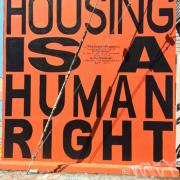
Members Discuss Resisting Evictions Amid COVID with UN Special Rapporteur on Housing
On 20 April 2021, ESCR-Net members from around the world convened for an exchange with the UN Special Rapporteur on Housing, Balakrishnan Rajagopal on the question of resisting evictions amid COVID-19. Upholding housing rights during the pandemic has been a focus of work for many members from the early days of the global health emergency. In late 2020, the UN Special Rapporteur issued his first report, covering precisely this topic, a document that served to anchor April’s discussion.
Executive Director of co-host Hakijamii, Dr. Nicholas Orago, presented introductory remarks at the event, detailing the fight for housing rights in Kenya in opposition to government-sanctioned mass forced evictions. Some of the evictions took place despite court orders to the contrary and in violation of international human rights law.As explained by Dr. Orago, “some governments, instead of using their messaging and the pandemic to enhance the protection of the lives and livelihoods of the people, decided to take advantage of the pandemic in order to achieve preconceived ideas of separating the rich from the poor by demolishing the housing of the poor and removing poor people from informal settlements in urban centers, so as to enhance urban gentrification and to ensure that urban space is only available to the rich in society.”
Participants spoke to the Rapporteur concerning housing rights struggles across regions. “In Spain,” explained Lucía Martín of the Plataforma de los Afectados por la Hipoteca, “the scourge of evictions has been dragging on for many years, especially since the bursting of the housing bubble, of the mortgage scam, which hit Spain in 2008. We still haven’t recovered from the evictions. During all this time, more than a million people have been evicted from their homes. Specifically in the period of the coronavirus pandemic, in 2020, more than 29,000 families have also been evicted from their homes.” Rodrigo Iacovini of the Pólis Institute detailed how, “since the beginning of the pandemic, civil society organizations in Brazil knew that evictions were going to be a major issue here in Brazil because connected to the pandemic, of course, it was going to be a deeper economic crisis. And there is no housing security here in Brazil without financial resources.”
In providing information to the Special Rapporteur, several participants raised the gender dimension of the need to resist evictions amid the pandemic. As the Rapporteur recognized, “we find that there is a significant percentage of evicted communities, individuals who end up as homeless, who are women, who are youth, or migrant labor, who are LGBTQ youth and individuals who in other ways have been more at risk of becoming homeless.”
Members also raised the impacts of evictions on already vulnerable populations such as sex workers and the urban poor who have been further marginalized because of the pandemic. The brutality with which some of the forced evictions are carried out was also a cause for concern for members.
In his closing remarks, the Special Rapporteur detailed his work on housing rights and the pandemic, expressing his appreciation for the information conveyed by civil society. Highlighting the challenges of the current context, Professor Rajagopal affirmed, “safe and adequate housing is critical to ensuring the health of everyone across the world during the pandemic. It cannot be achieved when evictions continue as usual...What is surprising is that the evictions have continued in many countries like in Kenya, in full force. The pandemic has not put a serious stop to the evictions. So last year I issued a call for a global moratorium on evictions during the pandemic.”
The event complemented a broad range of cross-network initiative on land, housing, and natural resource rights among network members’ own and collective work. For more information, see:
